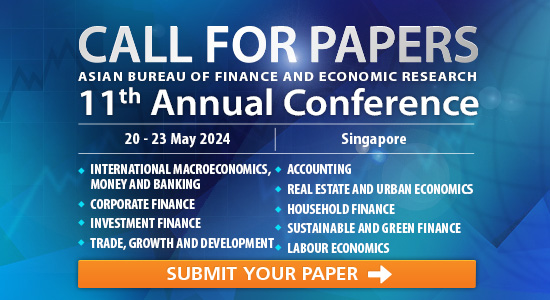Call for Papers
The Asian Bureau of Finance and Economic Research will be holding its 11th Annual Conference on 20-23 May 2024 at the Pan Pacific Singapore. We now invite submission of high quality papers for the conference, please submit in PDF at this link.
Conference Organization
The four days conference consists of nine programs and each program will meet for two or three sessions. Three papers will be presented for each session with assigned discussants and time for open discussion.
- International Macroeconomics, Money & Banking
- Corporate Finance
- Investment Finance
- Trade, Growth and Development
- Accounting
- Real Estate and Urban Economics (Joint with IREUS)
- Household Finance (Joint with IREUS)
- Sustainable and Green Finance (Joint with SGFIN)
- Labour Economics (Joint with NTUC) - New
Programs will run in parallel at any one time. One author is required to attend and present if the paper is selected. Some of the presented papers will be summarized in the ABFER Research Digest.
Daily Schedule
| 8:30 am - 9:00 am | Registration |
| 9:00 am - 12:30 pm | Workshop Programs (includes 30 minutes break) |
| 12:30 pm - 2:00 pm | Lunch |
| 2:00 pm - 5:30 pm | Workshop Programs (includes 30 minutes break) |
| 5:30 pm - 6:30 pm | Networking |
Related events such as industry roundtables, academia panels, master class and talks by distinguished speakers will be organised. Please refer to the conference program.
Topic of Interest
 |
For the program of International Macroeconomics, Money & Banking, we are interested in a variety of topics, including (but not limited to): central banking, exchange rates, financial crises, financial risk management, foreign direct investment, international capital flows, macroeconomic policy, monetary and fiscal policy, prudential regulation, systemic risk and other international macroeconomics and money & banking topics, particularly those of relevance to Asia. Program Directors:
|
 |
For the program in Corporate Finance, we are interested in all topics relevant to Asian firms, markets, or regulators - even if Asian data are not used. Past years' presentations have explored behavioral corporate finance, business groups, capital investment, capital structure, comparative corporate finance, corporate governance, dividends, financial development, law and finance, mergers and acquisitions, multinationals, ownership structure, tunneling, corporate innovation, fintech, climate risk, and other areas of research. Program Directors:
|
 |
For the program of Investment Finance, we are interested in a variety of topics, including, but not limited to: asset price fluctuations, asset allocation, behavioral finance, financial market microstructure, market efficiency, portfolio management, market timing, sovereign wealth funds, behavior investment finance, financial technology, and all other investment finance topics relevant to Asia. Program Directors:
|
 |
For the program of Trade, Growth and Development, we will consider any paper under this general theme, which is broadly interpreted. For example, interesting papers related to labor, financial markets, political economy and structural transformation in developing countries will also be considered. We welcome both applied theory and empirical papers. Program Directors:
|
 |
For the Accounting program, we are interested in accounting topics including but not limited to: the determinants and consequences of managers’ corporate financial reporting and disclosure decisions; the role of accounting information within organizations, including compensation; external auditing; the role of accounting in corporate governance; the effect of taxes on management decisions; the role of regulation in accounting and auditing practice. Ideally papers address these issues using data drawn from the Asia Pacific region or having direct relevance for this region. Program Directors:
|
 |
Real Estate is closely intertwined with the disciplines of macroeconomics, investment finance, and household finance. The Real Estate and Urban Economics program welcomes submissions of theoretical, empirical, and policy research in real estate finance, housing and urban economics, which include, but are not limited to, housing price and housing affordability; sustainable development issues; discrimination, disparities, and diversity in housing and real estate markets (e.g., mortgage lending, residential development); climate risks and real estate asset market implications; finance green and sustainable development; household finance; securitization and real estate capital markets; commercial real estate finance and investment; PERE and REITs; etc. Program Directors:
|
 |
Household Finance program encompasses topics on (1) how households make financial decisions relating to the functions of saving, consumption, investment, housing, payment, borrowing and risk management, (2) how organizations provide products and services to satisfy these financial functions, and (3) how interventions by firms, governments and other parties affect the provision of financial services. The scope of household finance spans multi disciplines, embracing not just finance and economics but also industrial organization, law, psychology and sociology. We welcome both applied and theoretical papers in this area. Program Directors
Conference Organizers:
|
 |
Sustainable and Green Finance program encompasses various topics related to how sustainability has become an important issue for companies, investors, financial intermediaries, and capital markets. Climate change and the corresponding regulatory initiatives and frameworks pose serious challenges for commercial operations in many industry sectors, and consequently financial intermediaries and capital markets. Understanding the sustainability of businesses and industries in this dynamic environment is vital for financial entities in order to assess and efficiently price these exposures. Innovations in green finance can also play a role in enhancing the sustainability of commercial operations. The development in sustainable and green finance relies on various disciplines beyond finance and economics, including natural sciences, law, geography, design, engineering, and computing. We welcome both applied and theoretical papers in this area. Program Directors:
|
 |
For the program in Labour Economics, we are interested in labour-related topics, including, but not limited to issues related to employment, labour in the global economy, workplace health and safety, and other labour trends (e.g. an ageing and multi-generational workforce, skills-based employment, mental well-being at work, technology bifurcation, and hybrid work). We especially welcome papers with tangible and actionable recommendations for the labour movement or with public policy relevance. Program Directors:
|
Timeline
| Submission Closing Date | 15 January 2024 |
|---|---|
| Paper Selection by | 15 February 2024 |
| Discussant Selection by | 1 March 2024 |
| Schedule Completion by | 15 March 2024 |
Things to Note
- We encourage submissions from early-career scholars and researchers, and those who are not affiliated with ABFER.
- Please feel free to submit work which will be considered for review/publication elsewhere.
- There will be no conference volume.
- Presented papers will be available on ABFER website and electronically distributed to participants and our Senior Fellows and Fellows.
- Previous conference programs and presented papers will remain accessible on our website.
- ABFER will provide a lump sum sponsorship (with cap) for overseas delegates (i.e. one author per paper and discussants) to partly cover their flights and hotel accommodations.
- Only those who are selected as presenters, discussants, or panellists will be notified.
Electronic Submission
Submission closed
Contact Information
| Program Directors | Conference Organizers |
|---|---|
|
Antonio FATAS (INSEAD) Takeo HOSHI (University of Tokyo) |
Yu-chin CHEN (University of Washington) Yi HUANG (Fudan University) |
| Program Directors | Conference Organizers |
|---|---|
|
Jun-Koo KANG (Nanyang Technological University) Randall MORCK (University of Alberta) |
Hong RU (Nanyang Technological University) Johan SULAEMAN (National University of Singapore) Alminas ZALDOKAS (National University of Singapore) |
| Program Directors | Conference Organizers |
|---|---|
|
Allaudeen HAMEED (National University of Singapore) Massimo MASSA (INSEAD) |
Darwin CHOI (Chinese University of Hong Kong) Roger LOH (Singapore Management University) Hong ZHANG (Singapore Management University) |
| Program Directors | Conference Organizers |
|---|---|
|
Nancy QIAN (Northwestern University) Michael SONG (Chinese University of Hong Kong) |
Pao-Li CHANG (Singapore Management University) Davin CHOR (Dartmouth College) Jennifer LA’O (Columbia University) |
| Program Directors | Conference Organizers |
|---|---|
|
Qiang CHENG (Singapore Management University) |
Allen HUANG (Hong Kong University of Science and Technology) Sterling HUANG (Singapore Management University) |
| Program Directors | Conference Organizers |
|---|---|
|
Yongheng DENG (University of Wisconsin-Madison) Sheridan TITMAN (University of Texas, Austin) |
Lu HAN (University of Wisconsin-Madison) |
| Program Directors | Conference Organizers |
|---|---|
|
Wenlan QIAN (National University of Singapore) Tarun RAMADORAI (Imperial College London) |
Cristian BADARINZA (National University of Singapore) Changcheng SONG (Singapore Management University) |
| Program Directors | Conference Organizers |
|---|---|
|
Laura STARKS (University of Texas at Austin) Johan SULAEMAN (National University of Singapore & SGFIN) |
Guojun HE (University of Hong Kong) Weina ZHANG (National University of Singapore & SGFIN) |
| Program Directors | Conference Organizers |
|---|---|
|
Jessica PAN (National University of Singapore) Patricia CORTES (Boston University) |
Pinchuan ONG (National University of Singapore) Suphanit PIYAPROMDEE (University College London) Silin YANG (National Trades Union Congress) |


